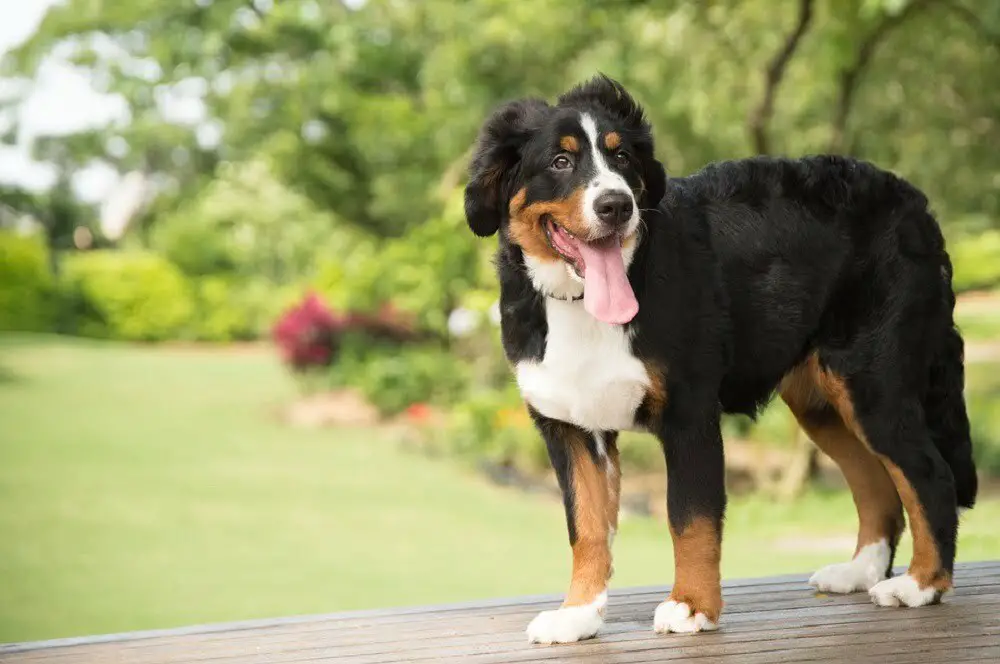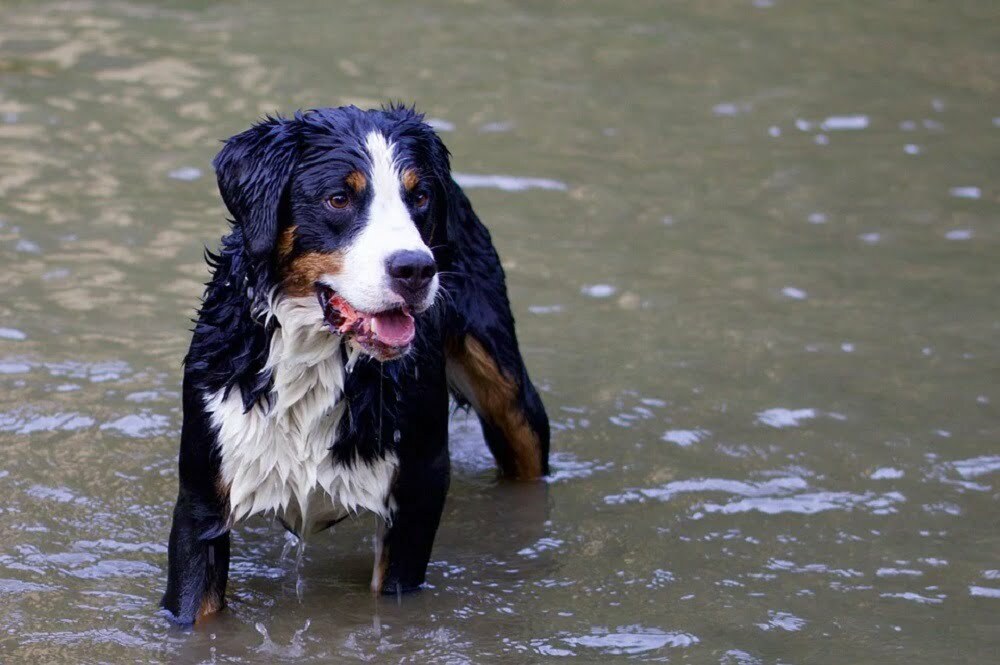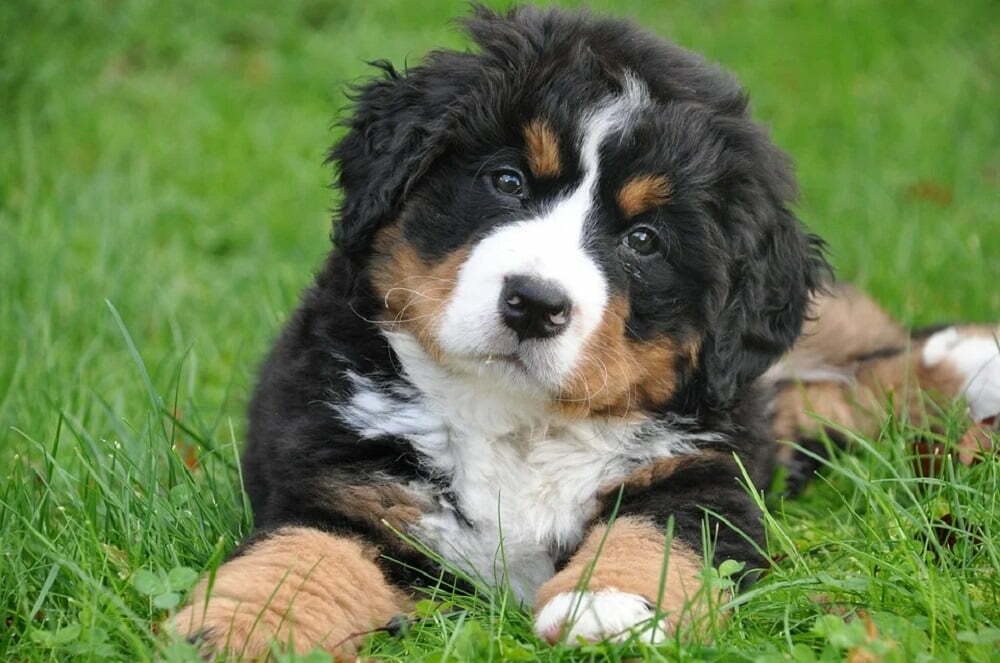Traditionally used as a working dog and watchdog, the Bernese Mountain Dog is a large dog breed known for its placid, good-natured temperament which makes them great family dogs and loyal companions.

Key Facts
Average lifespan
Sadly, the Bernese has one of the shortest life spans compared to other similar-sized breeds and purebred dogs in general. The average life expectancy of a Bernese Mountain Dog is approximately 7 to 8 years, while most breeds of a similar size live to be 10–11 years. However, in a 2004 survey carried out in the UK, the longest-lived of 394 deceased Bernese Mountain Dogs died at the age of 15.2 years.
Minimum exercise (per day)
Bernese Mountain Dogs have an energetic, puppy-like nature that they possess right into their senior years, so they need a fairly active household.
They were originally bred to be working dogs, so they need plenty of both physical and mental stimulation. They were also originally bred to endure the cold, snowy climate of the Swiss mountains, so it’s important to ensure they don’t overheat, especially during the warmer months.
Bernese Mountain Dogs will require at least one hour of exercise every day, which can be split into numerous walks and some off-lead time in secure areas. Additionally these pups will need plenty of playtime, training and free time in a large, secure garden.
Coat length: Medium
Minimum cost (per month)
You can expect to pay at least $145 a month to keep a Bernese Mountain Dog. The main cost will be their food, as they’ll require a special large dog diet, as well as plenty of toys, grooming supplies, vet fees, and pet insurance. This is separate from the initial cost of purchasing the dog and any medical emergencies that may arise, so like any dog, the Bernese Mountain Dog is a big financial commitment as well as a significant responsibility.
Appearance
- Size: large
- Average height: 58-70 cm
- Average weight: 42-53kg in females and 48-63kg in males
Temperament
Apartment Living
As large, energetic dogs who require plenty of exercise, Bernese Mountain Dogs need a spacious home with a large garden. This is not only due to their size, but also because they need plenty of space to play and roam around in, so they’re not suitable for apartment living.
Good for novice owners
Due to their thick coats which require a lot of maintenance, Bernese Mountain Dogs are probably not the best choice for novice owners. Not only this, but their size and strength take some getting used to, and they require a spacious home and yard. These are best suited to people who have previously owned large breeds or Bernese Mountain Dogs.
Sensitivity level
Bernese Mountain Dogs are highly sensitive, so they won’t do so well in a noisy, chaotic environment.
Tolerates Being Alone
Bernese Mountain Dogs are happiest when they’re with their owner or family. They need a great deal of companionship and do not like being left alone for more than a few hours. If left alone for long periods, they may get anxious and express their unhappiness through destructive chewing.
Tolerates Cold Weather
Bernese Mountain Dogs are built for cold weather – hence their name! They were originally bred to work in the cold, snowy mountains, and have medium-length, thick coats which keep them warm in low temperatures. You can take full advantage of this during the winter months, and take your Bernese on plenty of walks in the snow.
Tolerates Hot Weather
Due to their thick coat, Bernese Mountain Dogs are less suited to hot weather, and during the summer months, you’ll need to keep a close eye on your Bernese as they do not tolerate the heat well. Ensure they have access to plenty of shade, water, and cool air at all times during high temperatures.
Affectionate With Family
Bernese Mountain dogs can be very affectionate and love nothing more than spending time with their family.
Kid-Friendly
Bernese Mountain Dogs are known for being friendly and patient, and they generally do well with children, as they are very affectionate. They also allow children to climb over them – which is always tempting for children when they’re around a large breed! The only thing to bear in mind is that due to their strength and size, they can sometimes accidentally knock over small children or adults with little experience of the breed.
As with any dog, you should supervise children and vulnerable adults with your Bernese Mountain Dog and ensure that your dog has a room or area it can escape to for child-free relaxation. You should teach your children how to properly approach and interact with the dog and look out for signs of unhappiness or anxiety in your dog to help avoid any conflicts.
Dog Friendly
Bernese Mountain Dogs usually get along fine with other dogs, provided they’ve been well-socialized from a young age. They are not known for being aggressive and they’re unlikely to be confrontational towards other dogs.
That being said, introductions to unfamiliar pets need to be done gradually and carefully due to the large size of this breed. If you socialize your Bernese Mountain Dog from a young age, it should be fine with other pets, though it’s best not to leave them unsupervised with smaller pets at first.
Friendly Toward Strangers
Bernese Mountain Dogs may be somewhat aloof and standoffish towards strangers. They have a natural instinct to guard and may be wary of strangers and bark to warn them off. However, they will not usually bite and attack a stranger – they’re far too gentle for that!
Health And Grooming

Shedding
Bernese Mountain Dogs shed year-round, though they’ll shed even more during the spring and fall. During these seasons, they shed their undercoats to make way for a thicker or thinner undercoat depending on the temperature outdoors.
During their “blown-coat” seasonality, it’s essential to stay on top of regular brushing. During the early summer, it’s best to resort to daily brushing, just to keep the fur down. Brushing is usually the first line of defense to somewhat reduce the amount of fur that will gather around your home. Basically, a Bernese Mountain Dog may not be the breed for you if you’re somebody who isn’t prepared for constant grooming and cleaning.
Drooling
Drooling differs from dog to dog: some Bernese Mountain Dogs drool very little, while those with loose jowls can drool quite a bit, and their thick slobber can end up on their coat, in the house, and on you! This is another reason, combined with their shedding and their size, why the Bernese Mountain Dog isn’t for everyone. If your Bernese Mountain Dog is drooling more than usual, it could also be a sign of an underlying health issue.
Grooming
Bernese Mountain Dogs shed year-round, and the heaviest shedding is during seasonal changes in preparation for the winter and summer months.
Generally, they’ll require brushing on a weekly basis, but will need more frequent attention during the spring and fall when they shed at a greater rate. Grooming will help keep the dog’s coat looking neat and healthy and will reduce the amount of fur on your floor and furniture.
The Bernese will only require a bath about once every couple of months or so, though this depends on the dog’s activity level and how dirty its coat gets.
When grooming your Bernese Mountain Dog, you should pay special attention to their ears, as they can easily trap bacteria, dirt, and liquid. This could lead to an ear infection, which would require ear infection drops and weekly ear cleanings using a veterinarian-recommended cleanser.
General health
With their short life span and vulnerability to a range of health issues, it’s essential that Bernese Mountain Dogs are given the right care. All large and giant breed puppies benefit from special diets promoting slow growth to prevent developing joint problems like hip dysplasia.
Common health problems
Sadly Bernese Mountain dogs suffer from a disproportionate rate of cancer deaths- in both U.S./Canada and UK surveys, nearly half of Bernese Mountain Dogs surveyed die of cancer, compared to about 27% of all dogs. They can suffer from a range of cancer types including malignant histiocytosis, mast cell tumor, lymphosarcoma, fibrosarcoma, and osteosarcoma.
The Bernese Mountain Dog may also face inherited medical issues such as malignant histiocytosis, hypomyelinogenesis, progressive retinal atrophy, cataracts, and hypoadrenocorticism. The breed is also prone to histiocytic sarcoma, a cancer of the muscle tissue that is very aggressive, as well as hereditary eye diseases.
Bernese Mountain Dogs have an unusually high mortality rate related to musculoskeletal causes such as arthritis, hip dysplasia, and cruciate ligament rupture. Prospective Bernese Mountain Dog owners should be prepared to cope with a large dog that may develop mobility problems at a young age.
Due to their vulnerability to such medical issues, Bernese Mountain Dogs’ owners should ensure that their dogs receive OFA and CERF certificates.
Potential For Weight Gain
When it comes to large and giant breeds such as the Bernese, it’s essential to keep puppies and dogs on the lean side to avoid placing excessive strain on their joints.
These dogs require a specially designed diet and should be fed measured meals at scheduled times. Avoid free feeding (filling the bowl up at all times), as this can lead to an overweight dog, which further increases the risk of hip dysplasia and other health issues such as diabetes. If you’re unsure how much you should feed your dog, you should work with your veterinarian to determine the right amount.
Trainability
Easy To Train
Due to their large size, positive, reward-based training should start from an early age with the Bernese Mountain Dog. Without proper training, they could become boisterous and already pretty powerful due to their size. Due to their intelligence, these dogs are relatively easy to train, but inexperienced dog owners may wish to seek support from an accredited trainer.
It’s important to socialize your Bernese Mountain Dog from when they’re a puppy to get them used to other dogs, people, and different environments. The Bernese is a sensitive breed, so they require good socialization to help them grow into more confident dogs.
As with any dog, Bernese Mountain Dogs shouldn’t be left alone for more than four hours; even this may be too long for especially sensitive dogs. This breed is known for its attachment to its owners and may be prone to separation anxiety when you’re not around. For this reason, they require plenty of care and attention, and this will also help you bond.
Intelligence
Bernese Mountain Dogs are very intelligent and eager to please their owners, which makes them easy to train for experienced owners.
Potential to bite
These gentle giants should have no reason to bite other people or dogs if they are properly socialized and trained from a young age. These dogs are affectionate and loving by nature, so if they do bite, it could indicate some underlying issue, and it’s important to figure this out as soon as possible.
Tendency To Bark Or Howl
Bernese Mountain Dogs were originally used as working dogs, and part of their role was to act as a watchdog. This leftover trait may still be present in the breed, and your Bernese Mountain Dog may bark to alert you to a trespasser or stranger approaching the house.
They’re not a breed known for being excessively noisy, but they do have a deep, loud bark which puts some people off. Trust us though, their bark is bigger than their bite! If you’re having problems with excessive noise or barking, you should seek the advice of an accredited behaviorist.
History

The Bernese Mountain dog originated from Switzerland, around the city of Berne, which is where it takes its name from. Used as a general-purpose farm dog, this breed was used mainly to guard property and to drive dairy cattle long distances from the farm to the alpine pastures.
Bernese Mountain dogs were also used by farmers to transport carts of milk and cheese, which earned them the name “cheese dogs” from locals. Although it may have acted as a guardian for livestock, it was likely not a herding dog.
One of four related tricolored Swiss mountain dogs, the Bernese Mountain Dog is related to the Greater Swiss Mountain Dog, the Entlebucher Mountain Dog, and the Appenzeller.
These breeds all share the characteristic tricolor coat of black and white with tan accent – though only the Bernese Mountain Dog has a long coat. The dogs also have their roots in Roman mastiffs.
In some locales, the breed was called a Dürrbachhund or Dürrbächler, after a small town called Dürrbach where the large dogs were especially popular. In the early 1900s, fanciers exhibited Bernese Mountain dogs at shows in Berne, and in 1907 the first breed club was established by breeders from the Burgdorf region.
It was called the Schweizerische Dürrbach-Klub and was responsible for writing the first Standard which defined the dogs as a separate breed. By 1910, the club already boasted 107 registered members.
Costs
The average price for a Bernese Mountain Dog puppy is $1,150, however, this price increases for dogs with superior ancestry.
For superior breeds, the cost can start at $2,500 and even go as high as $10,000, if not more.
You could also consider adoption. Not only is it cheaper, but it offers an abandoned dog the chance of a loving home. The adoption price is between $350 to $550, and this price usually includes vaccinations and registrations.
Ongoing costs will include food, vet bills, and pet insurance, shampoo and grooming tools, training sessions, accessories such as leads and collars, a dog bed, and of course any medical treatments or procedures outside of routine check ups.
Fun Facts
- In the 1800s, Bernese Mountain Dogs were nicknamed “cheese dogs”, as they used to pull carts full of cheese in the Swiss Alps.
- Bernese Mountain Dogs are known for maturing at a slower rate than other dogs, and maintain a puppy-like energy throughout their lives.
- Bernese Mountain Dogs are also known for their infectious smiles! They often look like they are smiling at their owners.
- These dogs were originally used as work dogs, hence their power and strength, but they were also used as watchdogs to guard livestock.
- In the US, the Bernese Mountain dog is growing in popularity, and in 2013 it ranked at 32nd place by the American Kennel Club.
- These dogs are also very popular in German-speaking countries, where they are among the most popular dog breeds.
- While Bernese Mountain Dogs don’t possess much endurance, they can move with amazing bursts of speed for their size when motivated.
